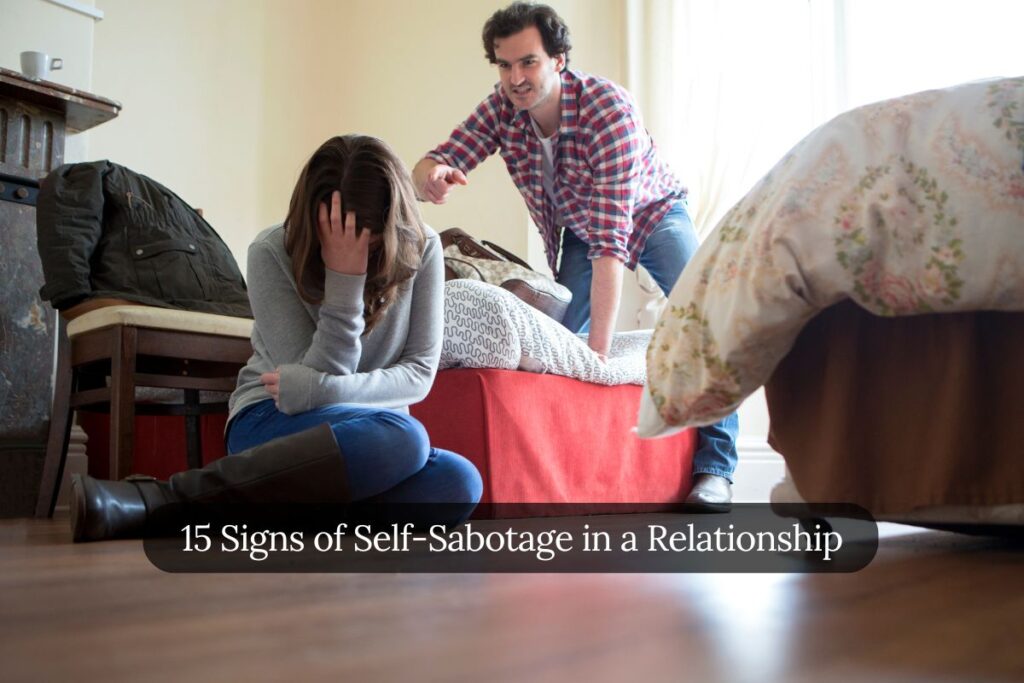Self-sabotage in relationships rarely looks dramatic. It often shows up in small, confusing ways, pulling away after closeness, overthinking harmless moments, creating distance just when things start to feel real.
Most people who self-sabotage aren’t trying to hurt their relationship. They usually want connection, but something inside reacts with fear when intimacy increases. Old experiences, self-doubt, or a fear of rejection can quietly shape how they behave without them fully realising it.
Because the behaviour doesn’t always feel intentional, many people miss the pattern. They assume they are “too sensitive,” “not built for relationships,” or simply with the wrong person. Over time, this confusion can strain even healthy relationships.
In this article, we’ll walk through common signs of self-sabotage in relationships, helping you recognise patterns that may be pushing connection away instead of protecting it.
Am I Self-Sabotaging My Relationship or Just Not Interested?
This is a common and confusing question. Self-sabotage and lack of interest can look similar on the surface, but they come from very different places.
Self-sabotage usually shows up when you do care, but feel unsafe being vulnerable. You may pull away after closeness, overanalyse small issues, test your partner’s commitment, or create distance when things start to feel serious. The behaviour is often driven by fear, not indifference.
Not being interested feels different. There is little internal conflict. You don’t feel anxious about losing the relationship, and distance doesn’t create guilt or worry. You may feel relief rather than tension when things slow down.
If you notice that you want connection but keep acting in ways that push it away, that pattern is more likely self-sabotage than disinterest.
15 Signs of Self-Sabotage in a Relationship

1. Constantly Seeking Validation
One common sign of self-sabotage is needing frequent reassurance to feel secure. You might start doubting your partner’s feelings when they spend time with friends, focus on work, or seem less available than usual. Small gaps in attention can trigger overthinking or fear that something is wrong.
This pattern often isn’t about your partner’s behaviour, it’s about what the silence or distance brings up inside you. When reassurance becomes the main way to feel calm, it can slowly put pressure on the relationship and make genuine connection feel tense instead of safe.
Learning to notice when reassurance is replacing self-trust is an important first step toward breaking this cycle.
2. Overthinking Everything
Overthinking often shows up when your mind fills in gaps that don’t actually exist. A late reply, a shorter message, or a different tone can quickly turn into a chain of worries about what your partner might be thinking or feeling.
You may replay conversations, analyse small changes in behaviour, or assume distance means disinterest. Even neutral situations, like your partner spending time with friends, can start to feel personal, as if something is being taken away from you.
This constant mental checking doesn’t usually bring clarity. It creates stress, drains emotional energy, and can slowly turn the relationship into a source of anxiety rather than comfort.
Noticing when your thoughts are running ahead of reality is often the first step toward breaking this pattern.
3. Pushing Your Partner Away During Conflict
For some people, conflict triggers withdrawal instead of confrontation. During disagreements, you might shut down, stop responding, avoid calls or messages, or create distance until things feel calmer.
This often isn’t about wanting space forever. It’s usually a way to protect yourself from feeling overwhelmed, hurt, or afraid of saying the wrong thing. Silence can feel safer than risking another argument.
The problem is that this distance is often experienced very differently by the other person. While you may be trying to cope, your partner may feel ignored, shut out, or unsure where they stand. Over time, this pattern can turn moments of conflict into emotional disconnection.
Recognising when pulling away is a response to discomfort, rather than a solution, is an important part of understanding self-sabotage.
4. Expecting Perfection from Your Partner
Self-sabotage can sometimes show up as very high expectations. You may notice yourself focusing on what your partner does wrong, replaying small mistakes, or feeling easily disappointed when they don’t respond exactly the way you hoped.
Often, the expectation isn’t conscious. You might simply feel that things would be “fine” if your partner were more attentive, more consistent, or less flawed. Over time, this can create a quiet sense of dissatisfaction, even when the relationship is generally healthy.
The issue isn’t wanting effort or care. It’s when perfection becomes the standard. No one can meet it consistently, and holding onto that expectation can slowly erode appreciation, patience, and emotional safety on both sides.
Noticing when your focus shifts from connection to constant evaluation can be an important clue that self-sabotage is at play.
5. Fear of Intimacy
Fear of intimacy doesn’t always look like avoiding relationships altogether. In many cases, it shows up only when closeness increases. Just as emotional or physical connection deepens, you may feel the urge to pull back, shut down, or create distance.
This reaction is often rooted in past experiences where closeness led to hurt, disappointment, or loss. Even if you want connection, part of you may associate intimacy with risk, making distance feel safer than vulnerability.
Over time, this push-and-pull pattern can prevent the relationship from growing naturally. The connection never fully settles because closeness keeps triggering withdrawal instead of comfort.
Noticing when distance appears specifically during moments of closeness can be an important sign of self-sabotage.
6. Avoiding Important Conversations
Avoiding important conversations is another common form of self-sabotage. You may notice yourself steering away from topics that feel uncomfortable, like your feelings, future plans, or issues that need clarity.
On the surface, everything may seem fine. You might tell yourself it’s better not to “rock the boat” or that the problem will resolve on its own. But unspoken concerns don’t disappear, they usually build quietly in the background.
Over time, this avoidance can create confusion, emotional distance, or repeated misunderstandings. The relationship starts carrying unanswered questions, even if nothing is openly said.
Recognising when silence is being used to avoid discomfort rather than protect the relationship is an important step in understanding self-sabotage.
7. Playing Emotional Games
Emotional games often show up when direct communication feels too risky. Instead of saying what you need or how you feel, you may withdraw, give the silent treatment, or act distant, hoping your partner will notice, worry, or respond a certain way.
These behaviours usually aren’t about manipulation in a calculated sense. They’re more often a way to protect yourself from rejection or vulnerability. Creating distance can feel safer than openly asking for reassurance or care.
The problem is that these patterns create confusion rather than closeness. Your partner may feel shut out or unsure of what’s wrong, while the original need remains unspoken. Over time, this can weaken trust and make emotional connection feel unstable.
Noticing when indirect behaviour replaces honest expression can be an important sign of self-sabotage.
8. Feeling Insecure About Yourself
Insecurity can quietly shape how you show up in a relationship. You may question whether you’re good enough, compare yourself to others, or worry that your partner will eventually lose interest.
These thoughts can trigger jealousy, doubt, or constant overthinking, even when there’s no clear reason for concern. You might read too much into small changes or assume distance means rejection.
When insecurity drives the dynamic, the relationship can start to feel tense instead of supportive. The fear of being left can ironically push connection away, creating the very outcome you’re trying to avoid.
Noticing when self-doubt is influencing how you interpret your partner’s actions is an important step in recognising self-sabotage.

9. Holding On to the Past
Holding on to the past can quietly shape how you experience your current relationship. You may find yourself comparing your partner to an ex, replaying old betrayals, or staying emotionally alert for signs that past hurt might repeat itself.
Even when the relationship in front of you is different, unresolved memories can keep influencing how safe or trusting you feel. Old wounds can resurface during arguments, making present situations feel heavier than they actually are.
When the past keeps entering the present, it can create emotional distance and prevent the relationship from settling into trust. The bond struggles to grow because it’s constantly being measured against what already went wrong before.
Noticing when old experiences are colouring your reactions today is an important sign of self-sabotage.
10. Refusing to Compromise
Refusing to compromise can be a subtle form of self-sabotage. You may feel strongly attached to how things should be done and struggle to adjust, even in small ways. Giving in might feel like losing control, being misunderstood, or having your needs overlooked.
This isn’t always about stubbornness. Sometimes compromise feels threatening because it brings up fears of being taken for granted or not being valued. Holding your ground can feel like self-protection.
Over time, though, a lack of flexibility can leave your partner feeling unseen or unimportant. The relationship starts to feel rigid, where connection takes a back seat to being right.
Noticing when compromise feels emotionally unsafe, rather than simply inconvenient, can be an important sign of self-sabotage.
11. Becoming Too Independent
Being independent isn’t a problem on its own, but it can turn into self-sabotage when it becomes a way to avoid emotional reliance. You may keep your struggles to yourself, avoid asking for support, or feel uncomfortable needing your partner in any way.
Often, this comes from a belief that relying on someone makes you weak or vulnerable. Staying self-sufficient can feel safer than risking disappointment or rejection. On the surface, everything looks fine, but emotional closeness stays limited.
Over time, this distance can leave your partner feeling shut out or unsure of their role in your life. The relationship may start to feel more like two separate worlds than a shared one.
Noticing when independence is being used to avoid connection, rather than support it, is an important sign of self-sabotage.
12. Neglecting Your Own Needs
Neglecting your own needs can become a quiet form of self-sabotage. You may focus so much on keeping your partner happy that you stop paying attention to what you feel, want, or need. Over time, your own preferences, limits, or discomfort fade into the background.
This often doesn’t come from generosity alone. Sometimes it’s driven by a fear that expressing your needs might cause conflict, disappointment, or distance. Staying agreeable can feel safer than risking tension.
Eventually, this imbalance can lead to exhaustion, resentment, or a sense of being invisible in the relationship. When your needs remain unspoken, connection suffers, even if everything appears fine on the surface.
Noticing when self-sacrifice replaces self-expression is an important sign of self-sabotage.
13. Sabotaging the Relationship When Things Are Going Well
For some people, the most uncomfortable moments in a relationship aren’t the fights, they’re the calm, happy phases. When things feel stable or close, you may suddenly start doubting the relationship, picking fights, or pulling away emotionally.
This reaction often comes from fear rather than dissatisfaction. When happiness feels unfamiliar, it can trigger anxiety about losing it or getting hurt later. Creating distance can feel like a way to regain control or prepare for disappointment.
The problem is that this pattern interrupts moments of genuine connection. Instead of allowing the relationship to settle and deepen, closeness becomes something to escape from rather than enjoy.
Noticing when discomfort shows up specifically during good phases of the relationship can be a key sign of self-sabotage.

14. Fear of Commitment
Fear of commitment doesn’t always mean you don’t care about the relationship. Often, it shows up as hesitation around future steps, avoiding conversations about long-term plans, or feeling uneasy when commitment becomes more concrete.
You may enjoy the relationship as it is but feel anxious when it starts moving toward permanence. This fear can come from past hurt, a fear of losing independence, or uncertainty about whether you’ll be able to meet expectations over time.
When commitment feels threatening, relationships can stall in an in-between space. Things don’t fall apart immediately, but they don’t fully move forward either. Over time, this lack of direction can create frustration, confusion, or emotional distance for both partners.
Noticing when fear shows up specifically around future planning is an important sign of self-sabotage.
15. Constantly Looking for Problems
Constantly looking for problems can be a subtle form of self-sabotage. You may find yourself scanning the relationship for what’s missing, what could go wrong, or what might become an issue later, even during calm or happy phases.
Instead of enjoying moments of connection, your attention stays fixed on potential flaws. Small imperfections feel larger than they are, while positive experiences pass quickly or feel temporary. Over time, this mindset can create dissatisfaction, even when the relationship itself is stable.
This pattern often comes from a need to stay emotionally prepared rather than a genuine problem in the relationship. Staying alert can feel safer than relaxing into closeness.
Noticing when your focus automatically shifts to what’s wrong, instead of what’s working, can be an important sign of self-sabotage.
If Your Partner Is Self-Sabotaging the Relationship
Self-sabotage doesn’t only show up in your own behaviour. Sometimes, you may recognise these patterns in your partner. Sudden withdrawal, mixed signals, fear around closeness, or repeated cycles of pushing away after intimacy can be signs of self-sabotage rather than a lack of care.
Understanding this difference can help you respond with clarity instead of confusion.
Final Thought
Self-sabotage in relationships rarely comes from a lack of love. More often, it grows out of fear, self-doubt, or old patterns that surface when closeness starts to matter.
Noticing these signs isn’t about labelling yourself or your relationship as broken. It’s about becoming aware of the moments where protection turns into distance, or where fear quietly replaces trust.
Change doesn’t begin with fixing everything at once. It usually starts with recognising patterns as they happen and choosing to respond differently, even in small ways. Awareness creates space, and in that space, healthier connection becomes possible.




